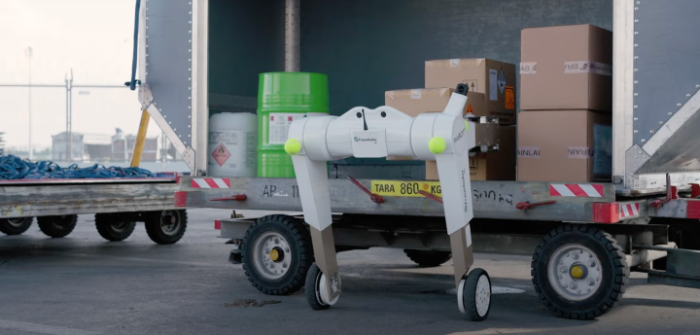Munich Airport in Germany has trialled an air freight robot developed at the Fraunhofer Institute for Material Flow and Logistics (IML).
The dynamically stable transportation robot is characterized by its arms and the adaptive load pickup made possible by them. It can take on a wide range of tasks such as handling hazardous goods, transporting parcels for longer recurring distances, relieving employees during lifting and overhead work, procuring materials or even providing support during the loading and unloading of aircraft.
Despite its load capacity, the evoBOT is agile on its two wheels. It can reach a maximum speed of up to 60km/h and transport a load of up to 100kg. It can operate either alone or with others and, thanks to its maneuverability, it can be operated in various areas both indoors and outdoors. It also has a small carbon footprint.
The Digital Testbed Air Cargo (DTAC), in the context of which the current test was carried out, and the initial development of evoBOT are funding programs of the German Federal Ministry for Digital and Transport (BMDV). In addition to Cargogate Munich Airport and Fraunhofer IML, the DTAC project consortium includes nine other partners from research and industry: CHI Deutschland Cargo Handling, Flughafen Köln/Bonn, Frankfurt University of Applied Sciences, Fraport Frankfurt Airport Services Worldwide, Lufthansa Cargo, LUG Aircargo Handling, Mitteldeutsche Flughafen, Schenker Deutschland and Sovereign Speed.
According to the airport, autonomous vehicles and robots will have a major impact on the future of air freight; high throughput rates have to be managed, irrespective of the availability of skilled workers, while digitalization is advancing ever faster.
Professor Michael ten Hompel, managing director of Fraunhofer, said, “Our evoBOT is the beginning of a new population of autonomous vehicles and robots. With its arms and the fact that it moves on two wheels, it represents a step on the path to the humanoid future of robotics. The practical test carried out at Munich Airport impressively underpins the potential of this development. The evoBOT can work as a fellow colleague in a wide range of applications.”
Claudia Weidenbusch, managing director of Cargogate Munich Airport, said, “Against the backdrop of rising air freight figures and the challenges of recruiting employees, we are very pleased to be able to take a look into the future with Fraunhofer IML. Into the very near future at that.”
Jost Lammers, CEO of Munich Airport, commented “The development and expansion of the cargo and logistics sector are essential components of our corporate strategy. We welcome every initiative to optimize and digitalize handling processes. The evoBOT will facilitate the day-to-day work of our employees in the cargo area and make the workplace more attractive.”
To find out more about Munich Airport’s latest developments, click here.

